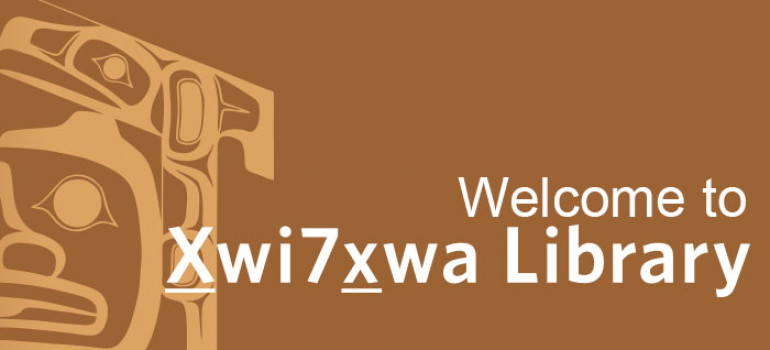By Bronwen McKie, Student Librarian, X̱wi7x̱wa Library
IRSI is pleased to present this guest blog post from the team at X̱wi7x̱wa Library.

Are citation practices fair to Indigenous scholars? In a 2018 episode of CBC’s Unreserved podcast, Dr. Kyle Powys Whyte and former UBC Professor Dr. Sarah Hunt argued that they're not.
Dr. Whyte is Potawatomi and a Professor of Philosophy and Community Sustainability at Michigan State University. Dr. Hunt is Kwagu’ł from Kwakwaka’wakw Nation and currently Assistant Professor & Canada Research Chair, Indigenous Political Ecology at the University of Victoria. Both cite the discriminatory and often demoralizing experiences faced by Indigenous scholars who are frequently expected to cite white male scholars and Western academic knowledge in order to legitimize and publish their work.
These “citational politics” are powerful knowledge gatekeeping strategies. Who scholars cite, how scholars cite, and what sources are considered authoritative to cite can validate and legitimize knowledge or oppress knowledge. Frequently, Indigenous ways of knowing (oral teachings and histories in particular) are delegitimized in academia by citational politics.
Lorisia MacLeod, a librarian from James Smith Cree Nation, was familiar with the politics of citation. In 2018, MacLeod worked at NorQuest College Library in Edmonton. There, she noted that Indigenous oral knowledge was often cited under “personal communication” and “unpublished interview” formats in scholarly work, labels that are negatively perceived as transitory, non-critical, and non-credible sources of information--perceptions that don't accurately or adequately reflect the reality of Indigenous knowledge.
Further issues arise when using APA style, where personal communication and unpublished interviews are not given full reference citations in the references page that proceeds a scholarly article. And while using MLA style requires that personal communication and unpublished interviews are given full reference citations, those citations are not sufficient for citing Indigenous traditional knowledge..
MacLeod asserted Indigenous oral knowledge deserved the same level of respect as published Western knowledge. So, in an effort to legitimize and support Indigenous ways of knowing in academia, she developed templates for citing Indigenous Elders and Knowledge Keepers that correspond with MLA and APA citation styles.
MacLeod’s MLA and APA citation templates include instructions for creating in-text and full reference citations. They also include important cultural elements such as the name of the Elder or Knowledge Keeper sharing knowledge and the Nation/community that the knowledge belongs to. Full descriptions of MacLeod’s templates are available on X̱wi7x̱wa Library’s First Nations and Indigenous Studies research guide.
While not officially adopted into the MLA and APA citation style guides, MacLeod’s templates are supported by many universities and colleges across North America, including the University of British Columbia. These templates are particularly useful for scholars doing community-based research.
In fall 2019, X̱wi7x̱wa staff noticed that students struggled to understand the scholarly reasons for citing and needed help to produce properly formatted citations for coursework. In response, X̱wi7x̱wa facilitated two Citation Basics workshops, each of which included a section about citing Elders and Knowledge Keepers using MacLeod's MLA and APA templates. Participants enjoyed this part of the workshop but were hopeful that a Chicago citation style template could be created too, given that Chicago is a common citation style and is used in a number of academic disciplines at UBC.
Building on MacLeod’s work, X̱wi7x̱wa is currently working to finalize a template for citing Elders and Knowledge Keepers in Chicago style. This initiative is designed to support the experience of Indigenous researchers and students at UBC and challenge “citational politics.”
For an example of what a Chicago template for citing Elders and Knowledge Keepers looks like, take a look at Kwantlen Polytechnic University’s recently published Chicago template. X̱wi7x̱wa’s template should be available by the end of September.
In the interim, X̱wi7x̱wa would love to hear from you: what do you, as scholars and learners, think about these templates? How could they be useful to you in your research, teaching and learning? Please email xwi7xwa.library@ubc.ca to send feedback, comments or questions.
X̱wi7x̱wa wishes to thank Lorisia MacLeod for her guidance, support and invaluable contribution throughout this process.
